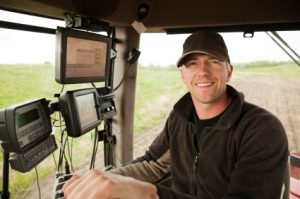Young Farmers and Driverless Tractors
 Back in the good old days, farming relied on horses or some other type of draft animal and a farmer with a strong back. Today you’ll find fewer people in the field and more automated equipment. A recent article (Farmers Prepare for the Data Harvest) in the Wall Street Journal points out that modern day “tractor cabs have come to resemble airplane cockpits.” Last week in Slate, I found an article about Kinze Manufacturing, an Iowa-based farm equipment company, and a John Deere tractor pulling a grain cart. It seems the tractor relies on auto-steer technology to function without a driver. That’s right — there’s no one driving this tractor.
Back in the good old days, farming relied on horses or some other type of draft animal and a farmer with a strong back. Today you’ll find fewer people in the field and more automated equipment. A recent article (Farmers Prepare for the Data Harvest) in the Wall Street Journal points out that modern day “tractor cabs have come to resemble airplane cockpits.” Last week in Slate, I found an article about Kinze Manufacturing, an Iowa-based farm equipment company, and a John Deere tractor pulling a grain cart. It seems the tractor relies on auto-steer technology to function without a driver. That’s right — there’s no one driving this tractor.
There were a few interesting points that stood out in this article:
- “For every farmer under 35, there are nearly six who are 65 or older.”
- “Even if they want to try a few autonomous technologies, these new farmers can’t afford them.”
- “…young farmers are also very similar to their non-farming peers: tech-savvy, purpose-driven, and entrepreneurial.”
- “…autonomous technologies can drastically improve farmers’ quality of life.”
These four points clearly show that the future of farming is changing. Even as the younger generation implements new technologies in the field, they are faced with considerable costs. The first obstacle is often the lack of capital available to these young farmers. Provided they can afford the technology, the question becomes which bot is right for their specific needs. And finally, their ability to produce higher yields at lower costs is hindered by the high-costs of maintaining up-to-date equipment and hiring people who understand the technology. It’s not an ideal scenario for any entrepreneur.
A couple of years ago, I posted about technology in precision farming being used to save time and money in the field. More and more farmers are adopting new means of monitoring and controlling their farms. But it’s not just about saving time and money for these farmers. Automating processes and machinery allows these young entrepreneurs to have more time for managing the business side of their farms, spending time with their families or doing whatever else they enjoy. In short, it offers them a better quality of life than previous generations of farmers have experienced. We have the technology available to help these farmers make great strides, but our challenge is to find more cost-effective ways to help them automate their farms.
What are your thoughts on precision farming? Is it worth the costs to automate farms?
Categories:
